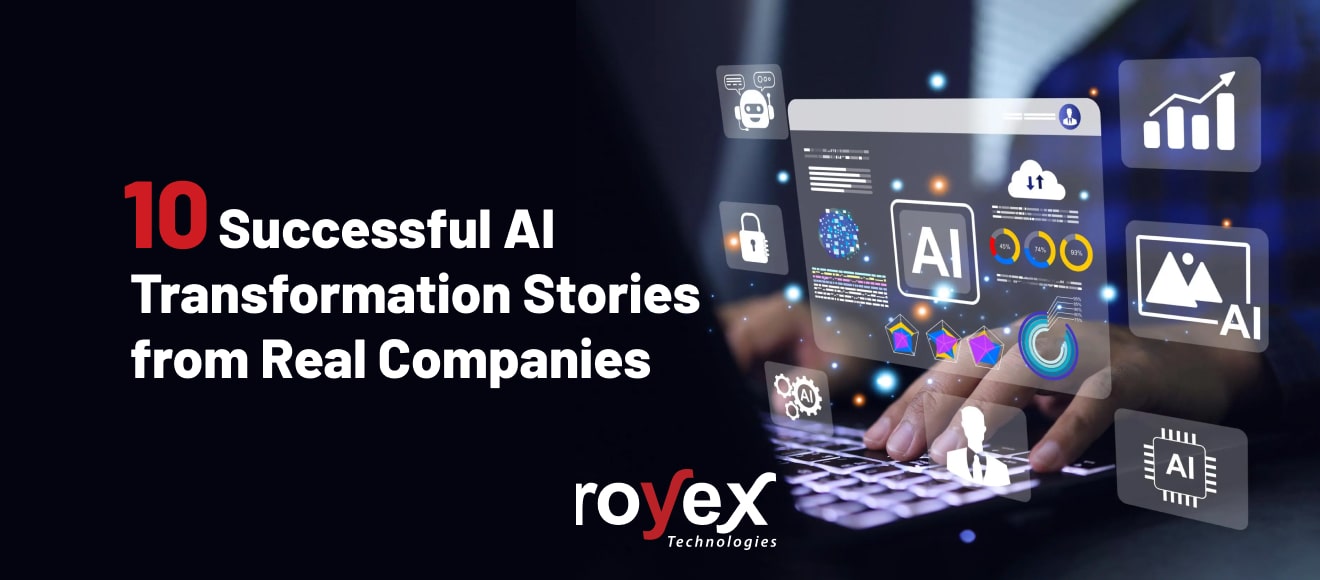
10 Successful AI Transformation Stories from Real Companies
Artificial Intelligence (AI) has moved from a futuristic concept to a present-day powerhouse, transforming how companies operate, innovate, and serve customers. Businesses across industries are leveraging AI to redefine their models, improve efficiencies, enhance customer experience, and drive growth. This blog explores ten real-world AI transformation stories that exemplify how companies have embraced AI and achieved remarkable results.
1. Amazon – AI at the Heart of E-Commerce

Amazon has been a pioneer in AI adoption, seamlessly integrating it into almost every facet of its operations. The company uses AI algorithms to power its recommendation engine, analyze customer behavior, and personalize shopping experiences. In logistics, Amazon employs AI to optimize delivery routes, manage inventory, and automate warehouse operations using robotics. AI has also driven Amazon’s Alexa, making voice-assisted shopping and smart home integration a reality.
Impact: Increased sales through personalized recommendations, enhanced customer satisfaction, and reduced operational costs.
2. Netflix – Personalizing Content with Precision
Netflix uses AI to understand viewer preferences and recommend content that aligns with their tastes. The company’s AI models analyze millions of user actions, including what content users watch, how long they watch, and what they skip. This data-driven personalization increases user engagement and reduces churn.
Impact: Boosted subscriber retention, improved content delivery, and optimized production investments.
3. Eyaana – Transforming Customer Support with Conversational AI

Eyaana is a prime example of how AI can revolutionize customer support. Designed to provide intelligent, omnichannel support, Eyaana uses AI chatbots, live human agent collaboration, multilingual capabilities, and visual recognition to enhance customer engagement. With AI at its core, Eyaana is continuously evolving to stay ahead of customer expectations.
Agentic World: A dynamic AI environment where agents (both human and AI) collaborate intelligently to deliver seamless support.
Live Translation on Call: Break language barriers in real-time with live multilingual translation during voice or video calls.
AI Voice Cloning: Personalize interactions using AI-generated voice replicas that maintain brand tone and familiarity.
CRM Action Plan: Automated and intelligent CRM suggestions that generate actionable plans based on customer behavior, historical data, and sales insights.
Impact: Faster response times, improved customer satisfaction, reduced support costs, and 24/7 availability.
4. BMW – Smart Manufacturing with AI
BMW uses AI extensively in manufacturing to enhance quality control and streamline production. AI-powered image recognition systems inspect car parts for defects, while predictive maintenance tools minimize downtime by anticipating machine failures. The company also utilizes AI for autonomous driving R&D and driver-assist features.
Impact: Reduced defects, increased production efficiency, and improved product safety.
5. Unilever – Driving Marketing and Supply Chain Efficiency
Unilever has embraced AI to optimize marketing strategies and streamline its supply chain. AI-driven analytics help the company forecast demand more accurately, manage inventory, and reduce waste. In marketing, Unilever uses AI to identify trends and personalize campaigns, enhancing customer engagement.
Impact: Improved forecasting accuracy, better marketing ROI, and lower operational costs.
6. Spotify – Creating Hyper-Personalized Music Experiences

Spotify employs AI to curate personalized playlists such as Discover Weekly and Release Radar. Machine learning models analyze listening habits, search patterns, and social behavior to recommend songs. Spotify also uses AI to understand sentiment in music and predict what users might enjoy.
Impact: Increased user engagement, higher user satisfaction, and competitive differentiation.
7. Tesla – AI at the Wheel of Innovation
Tesla’s innovation is driven by AI, particularly in its autonomous driving capabilities. The company’s AI systems process data from cameras, radar, and sensors to make real-time driving decisions. Tesla also uses AI in battery management, production planning, and customer interaction through its mobile app.
Impact: Improved vehicle safety, customer loyalty, and advancement in self-driving technology.
8. Sephora – Revolutionizing Beauty Retail
Sephora uses AI to enhance both online and in-store customer experiences. Its Virtual Artist app uses augmented reality and AI to let users try on makeup virtually. AI also powers Sephora’s chatbot, which provides personalized product recommendations and skincare advice based on user data.
Impact: Enhanced customer engagement, increased conversion rates, and higher customer satisfaction.
9. HSBC – AI in Risk and Fraud Management

HSBC uses AI to combat fraud and enhance compliance. AI models analyze transaction data in real-time to detect unusual behavior and flag potential fraud. The bank also uses AI for credit risk modeling, customer service chatbots, and to streamline regulatory reporting.
Impact: Reduced financial crime, improved compliance, and better customer protection.
10. Zara – Fast Fashion Meets Smart Forecasting
Zara leverages AI to stay ahead in the competitive fast fashion industry. AI algorithms help predict fashion trends, manage inventory, and determine optimal store layouts. Zara’s systems analyze social media trends, sales data, and customer feedback to make informed design and stocking decisions.
Impact: Shorter design-to-shelf times, reduced unsold inventory, and a more responsive supply chain.
Key Takeaways from These Transformations

These ten companies demonstrate the immense potential of AI when applied strategically. Here are some common success factors:
Clear Strategic Vision: Each company had a defined goal for AI integration aligned with business objectives.
Data Readiness: A robust data infrastructure was key to unlocking AI’s potential.
Customer-Centricity: Many AI transformations centered around improving customer experience.
Innovation Culture: A willingness to experiment and adapt new technologies made these transitions possible.
Ethical Use of AI: Companies took steps to ensure fairness, transparency, and accountability.
Final Thoughts
AI transformation is no longer optional—it is critical for staying relevant and competitive. The companies highlighted here show that regardless of industry, AI can be a game-changer. With the right strategy, infrastructure, and mindset, businesses can unlock new levels of efficiency, innovation, and customer satisfaction.
We empower businesses to begin and scale their AI transformation journey. Whether it's customer support, sales, analytics, or marketing, our AI-powered platform helps companies harness the full potential of artificial intelligence. Let us help you write your own success story in the age of AI.




